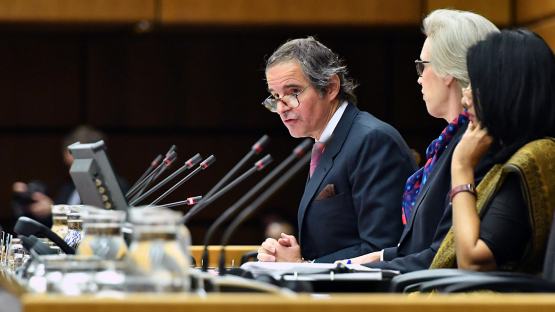IAEA Director General Rafael Mariano Grossi called on Iran on Monday to cooperate immediately and fully with the IAEA and provide prompt access to locations which it has refused to let Agency inspectors visit.
“The Agency has identified a number of questions related to possible undeclared nuclear material and nuclear-related activities at three locations that have not been declared by Iran,” Mr Grossi said in his first address to the Agency’s Board of Governors as Director General.
“The Agency sought access to two of the locations. Iran has not provided access to these locations and has not engaged in substantive discussions to clarify the Agency’s questions. This is adversely affecting the Agency’s ability to clarify and resolve these questions and to provide credible assurance of the absence of undeclared nuclear material and activities in Iran. I call on Iran to cooperate immediately and fully with the Agency, including by providing prompt access to the locations specified by the Agency.”
Mr Grossi, who took up office in December, presented two Iran-related reports to the Board. One concerned Iran’s implementation of its nuclear-related commitments under the Joint Comprehensive Plan of Action (JCPOA), signed between world powers and Iran in 2015. The other describes the Agency’s efforts to clarify information relating to the correctness and completeness of Iran’s declarations under its Safeguards Agreement and Additional Protocol with the IAEA.
Referring to JCPOA implementation, Mr Grossi noted Iran’s announcement on January 5th that its nuclear programme would no longer be “subject to any restrictions in the operational sphere.”
“To date, the Agency has not observed any changes to Iran’s implementation of its nuclear-related commitments under the JCPOA in connection with this announcement, or in the level of cooperation by Iran in relation to Agency verification and monitoring activities under the JCPOA,” he said.
“The Agency continues to verify the non-diversion of nuclear material declared by Iran under its Safeguards Agreement. Evaluations regarding the absence of undeclared nuclear material and activities in Iran continue,” Mr Grossi added.
The IAEA continues to monitor the nuclear programme of North Korea, also known as the Democratic People’s Republic of Korea, using open source information and satellite imagery. IAEA inspectors were required to leave the country in 2009.
“We are investing considerable effort in ensuring that we are ready to resume verification of the Democratic People's Republic of Korea’s nuclear programme if a political agreement is reached among countries concerned,” Mr Grossi said. “If and when such an agreement is achieved, we will be ready to deploy our inspectors from day one. The Agency will have an indispensable role to play.”




